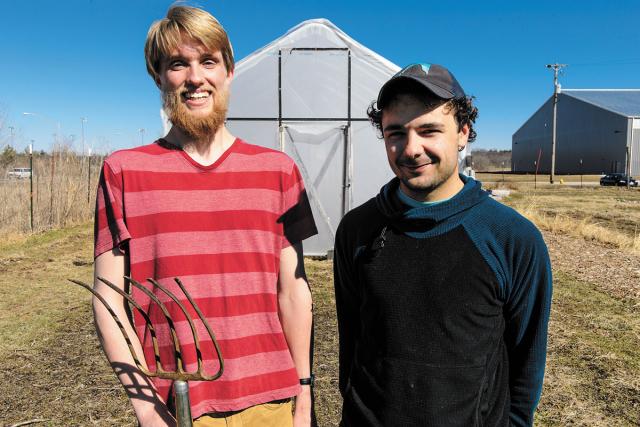College of Liberal Arts & Sciences
Growing Garden Helps Students Grow Careers

When Kain Kutz and Andrew Hirst first signed on to participate in the UI Student Garden, they didn’t anticipate how much more they would learn than how to yield the best tomato crop.
By tending to nearly half an acre on the west side of campus, the two students—now co-presidents of the student organization—learned to grow a variety of vegetable, herbs, and flowers. They also picked up valuable job skills, fine-tuned their career aspirations, and gained personal insight.
“I always knew I would pursue a career that involved protecting the environment, and in high school I thought I might become a forest ranger or work with the Department of Natural Resources,” says Kutz, a senior from Fort Dodge, Iowa, who is majoring in environmental policy and planning, and minoring in hydrosciences and geography. “But at Iowa I’ve learned that farming and agriculture can provide better opportunities to have a bigger impact.”
The organization’s members not only physically maintain the garden from March to November, they also attend regular educational programs, conferences, and farm tours. Programming represents a cross-section of pertinent topics: sustainable farming, hunger, nutrition, soil preparation, microbes, herbology, botany, climate change, poverty, and social justice, among others. Weekly meetings are held in the UI Office of Sustainability, and members share a meal together a couple of times a semester using some of the harvested produce.
The organization also sells its organically grown produce (tomatoes, squash, beans, lettuce, herbs, and more) to Iowa Memorial Union Food Services, and its leadership is working to develop a for-credit gardening class through the Lifetime Leisure Skills department in the College of Liberal Arts and Sciences.
The garden benefits from some 1,000 volunteer hours each semester, whether that labor involves researching growing methods and best practices, turning the compost, or fixing the weed whacker. Hirst says about 15 members participate consistently while nearly 400 subscribe to the organization’s email list. In addition, many students enrolled in Introduction to Environmental Science volunteer in the garden to fulfill a course requirement.
Hirst, a junior from Waverly, Iowa, studying political science and environmental policy and planning, says leading the organization has equipped him with skills in finances and accounting as well as in conflict resolution and volunteer coordination.
“Planning and maintaining the garden is a good deal of work,” he says. “We’re basically learning how to run a farm—on top of taking classes.”
Although many UI Student Garden “alumni” have pursued careers in agriculture and organic farming, membership is open to students of all majors—as well as to community members.
“We have had students interested in planting methods as well as those who wish to gain more skills, develop self-reliance off the land, and become better at marketing, speaking, leading volunteers, business, and planning and design. Some are simply interested in being with friends,” Hirst says. “Our garden is limited only in the physical sense and the physical resources it has, but is unlimited in what it has to offer our members.”
Both Kutz and Hirst had gardened with their families before coming to Iowa. Kutz, who has conducted research on the use of a perennial grass as a biofuel, plans to attend graduate school to study industrial agriculture and its impact on water resources. Hirst is unsure in what field he’ll end up, but he does know one thing.
“Gardening, in some capacity, will always be part of my life,” he says, adding that his experience with the UI Student Garden has given him valuable perspective. “I think one of the most important reasons to learn about agriculture, gardening, and farming is that they are part of our identity, values, and culture. We should have a vested interest in both understanding and maintaining those practices that are most conducive to our well-being as humans and also to the well-being of our humus.”